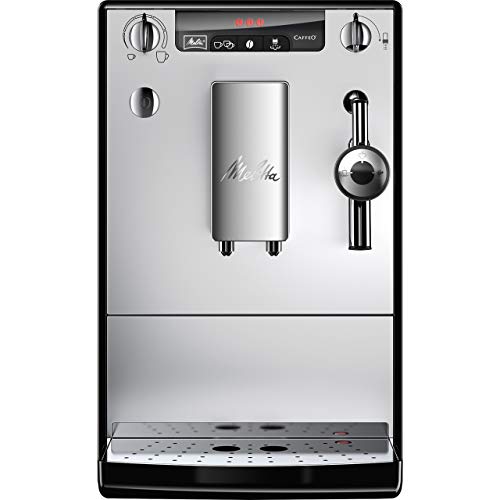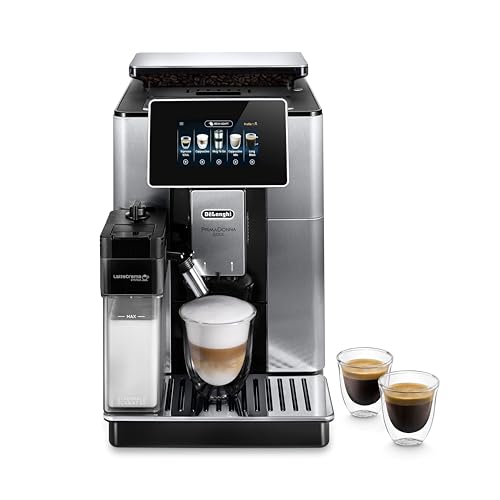12 Facts About Bean Coffee Machine To Make You Think About The Other P…
Page Information

Content
 Coffee bean to cup machine coffee bean to cup machine Machines
Coffee bean to cup machine coffee bean to cup machine MachinesIf you purchase a coffee bean machine, you can take pleasure in fresh, delicious whole-bean coffee made to your exact specifications. The machine grinds, measures, and tamps, and forces hot water into the ground to produce rich, delicious coffee.
 They offer a variety of advantages such as user-friendliness and less environmental waste when compared to pod machines. The machine is fully automated and operates by a simple press of the button.
They offer a variety of advantages such as user-friendliness and less environmental waste when compared to pod machines. The machine is fully automated and operates by a simple press of the button.Grinding
The grind you choose is crucial to a great cup of coffee. The size shape, shape, and consistency are all vital. When beans coffee machine are not properly ground, they can cause the water to move too quickly through the ground which can result in a lack of flavor or excessive extraction of bitterness.
A good grinder should come with a variety of sizes to allow you to choose the best method for your brew. It is important to experiment with different sizes of grinding, as they can drastically alter the flavor of your beverage. The smallest of particles are ideal for espresso and French presses, while larger, coarser particles are best for brewing in an immersion, such as with the Moka pot or Chemex.
If you're looking for an even more delicious cup of coffee, you can try roasting your own beans and then grinding them right before making the coffee. This will enhance the flavor and aroma and result in the perfect cup of coffee each time. To keep the freshness and taste of the beans, store them in an airtight jar in a dark, cool place.
Bean to cup commercial coffee machines offer unparalleled convenience and allow you to enjoy barista-quality coffee with the click of an button. These machines can handle everything, from preparing the coffee beans to the tamping process. They are a great choice for busy offices and cafes.
They start by grinding your selection of beans to a precise size. They can be set to match your preferred brewing method and can be programmed to serve the desired number of cups in one go. Some automatically tamp the grounds in order to create a perfectly compacted puck of coffee, which ensures the most consistent extraction.
A bean-to-cup machine typically has a large hopper for you to fill with beans. The machine will automatically grind the beans and dispensing the correct amount for your chosen brew. These machines will often have a display to display the size of grind and dosage selected and the total amount of drinks it's set to prepare.
Extraction
When the coffee bean is ground it breaks up into smaller pieces called particles. The size of the particles can affect the extraction and the taste of the final cup. In a bean to cup coffee machines for home to cup machine, the size of the beans is controlled prior making coffee so that it lines to the type of extraction required by the machine. This lets you make a great cup of espresso every time without the need for barista knowledge.
A bean-to-cup machine allows you to regulate the brewing time so that you achieve the strength you require. This is a major advantage over pod machines which give you less control and could result in less bitter or weak espresso. Bean-to-cup machines allow you to regulate not just the brew-time, but also the water temperature. This lets you determine how strong the coffee will be.
Extraction is an extremely delicate process that is dependent on the right proportion of particle size, dose and tamping pressure. A poor extraction of coffee could be caused by any of these factors. The coffee that isn't extracted well will taste sharp and sour and coffee that is over-extracted will taste dry and bitter.
In order to ensure that your coffee is extracted correctly, you need to have a good quality grinder and to use the correct beans. Light roasts are a bad choice when using espresso machines or fully automated machines because the short extraction time could cause the coffee to be lacking in body and flavor. Darker roasts that have a high Robusta percentage, like our Jhai (100 percent Robusta), or Tiga Terra are ideal for these machines because they offer more robust flavors and bodies.
Ultimately, choosing between a bean-to-cup machine and a pod coffee machine comes down to individual preference and convenience. Pod coffee machines are convenient to make tea and coffee. However, they can be less efficient and produce waste when disposed of used pods.
Dispensing
Whole beans eliminate pods, which can save you money and providing more flexibility. This also means you'll need to do more maintenance and cleaning of your machine than if you were using a pod-based machine.
Fortunately they've been designed with minimal maintenance in mind, and many come with features that can help with this. For instance, many coffee makers with beans-to-cups have automatic cleaning and rinsing cycles which makes it simple to keep your machine in good condition without disrupting your daily routine.
The possibility of adding hot, steaming milk to coffee beverages is an additional useful feature. This lets your team modify their drinks to their tastes and preferences while increasing productivity. Additionally, it's an excellent way to show your team members that you care about their well-being. It has been proved scientifically that coffee can boost the production of dopamine as well as norepinephrine, which increases the focus and motivation of employees.
Some models even offer additional beverage customization options, such as texturizing milk for cappuccinos and lattes. This feature is an important selling point for baristas, who may have only a limited amount of time to prepare each cup of coffee.
Another thing to look out for in a top quality bean-to-cup maker is its water tank and the size of the bean hopper. The water tank determines the amount of time the machine will run before it has to be replenished and the size of the hopper determines the frequency at which you'll have to replenish the beans. Generally, the larger the capacity of each, the less frequently you'll need to replenish.
Before buying a bean-to cup coffee maker, you should carefully consider the type of beans you'll be using as different grind sizes affect the taste and consistency of each cup. It is also important to check out the machine's programmable options that allow you to modify your drinks to exactly how you prefer them.
The dispensing spouts on your coffee bean machine might become clogged by ground coffee residue, or other debris left over after grinding. The spouts should be cleared regularly to avoid slow and inconsistent flow, which could lead to insufficient dosing of coffee grounds. This can be caused by too coarse a setting for grinding or excessively dry or oily beans or an absence of regular cleaning and rinsing.
Cleaning
Cleaning coffee machines is an essential aspect of running a machine to prevent the buildup of residues that can negatively impact the taste and quality of drinks. Regular cleaning helps to keep the machine in good shape and reduces the chance of a malfunction that could cause an expensive repair bill. A lot of bean-to-cup coffee machines come with a built-in cleaning cycle which will flush through pipes to clean the brewing unit. Others will have a separate milk side cleaning cycle in order to ensure that both spouts are clean and safe.
During the installation process, a reputable rental company will train their employees on how to clean and maintain the equipment. This will help reduce confusion and ensure that the steps are properly followed. With clear instructions and a thorough understanding of the process can aid in avoiding any errors that could lead to costly repairs or poor quality drinks.
It is best to wash the carafe, the permanent filter, and brew basket after each use in hot soapy water or in the dishwasher if they're designated as safe for this. It is a good idea to run a couple of times of clean water without any K cups or ground espresso in the machine. This will help to remove any oily residue and will stop the development of mould, bacteria or yeast.
For single-serve coffee machines or pods, it is a good idea to clean the machine thoroughly and descale every four weeks. This is typically done with vinegar. You can add up to 4 cups of vinegar in the reservoir, and then run the machine for a brewing cycle. When the cycle is complete, rinse and descale in accordance with the manufacturer's instructions. Run several cycles of clean water to get rid of any vinegar smell.
Commercial machines often have a built in telemetry system that logs the specifics of each cleaning cycle, and this can be viewed by you or your supplier to ensure that the machine is maintained regularly. This will also notify you the possibility that any of the moving parts are stuck or have seized, which would require more detailed maintenance and repair work.
- PreviousA Look Inside The Secrets Of Coffee Maker Bean To Cup 24.10.24
- NextUpvc Window And Door Repairs Near Me Tools To Help You Manage Your Daily Lifethe One Upvc Window And Door Repairs Near Me Trick That Should Be Used By Everyone Learn 24.10.24
Comment list
There are no registered comments.
